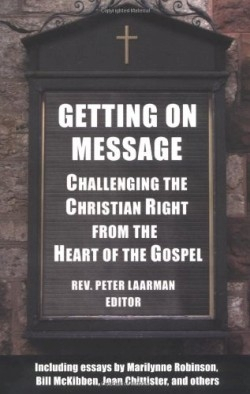Getting On Message
Challenging the Christian Right From the Heart of the Gospel
Recently, anyone who mentions the word “Bible” in a political context is assumed to be approaching an issue from the right … the religious right. This assessment is not necessarily accurate, but since the right has essentially made religious language their own provenance, it is not surprising. Enter this collection of essays by a broad range of Christian writers and scholars, each attempting to reclaim Biblical arguments for unapologetically progressive ideals.
The collection reflects the concerns of its editor, who worked as a communications specialist for a number of unions, attended Yale Divinity School, and served as senior minister at Judson Memorial Church in New York. Laarman has spent a lifetime committed to social justice and liberal activism. From his introduction he makes clear that he considers the rhetoric and activity of right-wing religious voices a form of fear mongering and a misrepresentation of the Gospel. To start the process of redressing the balance in religious dialogue, each of the fourteen pieces in the collection takes on a contemporary justice issue, from the mass detention of political prisoners to capital punishment and poverty, from marriage rights of gay and lesbian couples to the effects of consumerism on religious practice.
Most of the essays’ authors employ well-argued Biblical exegesis and historical context to make their points. In “Burying the Executioner’s Ax,” Dr. Patrick McCormick, a Catholic theologian, explores the Biblical arguments for and against capital punishment, convincingly concluding that while there are a few passages early in the Hebrew scriptures that show some support for execution as a method of justice, the preponderance of Biblical literature and all of the New Testament argues against it. In the collection’s opening essay, “Hallowed Be Your Name,” Marion Robinson, the Pulitzer Prize-winning author of the novel Gilead, makes an impassioned and articulate plea for contemporary Christians to return to the liberal roots of their traditions and reform their own lives and that of the United States.
One of the impressive things about the book is that every essay is clearly written and accessible. The writers come from most of the mainstream branches of Christianity and their work illustrates that diversity and progressive thinking are alive and well within traditions that are sometimes labeled as steeped in parochial conservatism. There is a nice balance between male and female voices and while no essay can be explicitly defined as “feminist theology,” it is clear that women’s voices are making themselves heard in some areas of Christian thinking.
This book will probably speak to those people who already see Christianity as a liberalizing force; it is unlikely to convert many of the more conservative practitioners. Nonetheless, it will give heart and some fine “ammunition” to those willing to take back the language of faith in the struggle for a liberal vision of social justice.
Reviewed by
Vicki Hughes
Disclosure: This article is not an endorsement, but a review. The publisher of this book provided free copies of the book to have their book reviewed by a professional reviewer. No fee was paid by the publisher for this review. Foreword Reviews only recommends books that we love. Foreword Magazine, Inc. is disclosing this in accordance with the Federal Trade Commission’s 16 CFR, Part 255.

